|
|
|
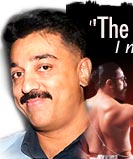
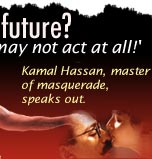
It is as if he is conserving all his energy, emotions and expressions. It is as if he is always waiting for that magical command, 'Action'. That's when the body undulates and the eyes light up. That's when the actor transforms into the character.
Meet Kamal Hassan, the master of masquerade.
He has come along way. He has traversed the length and breadth of the land, breaking linguistic barriers and leaving audiences incredulous at his repertoire and his seemingly inexhaustible bag of tricks. He has seen it all.
His careergraph, as a stock market analyst would put it, is full of higher tops and lower bottoms. But the fundamentals are strong. He is the trapeze artiste who walks the tight rope between art and commerce. He has faltered but never fallen.
The press has fawned and frowned upon him depending on their personal equation with the man. Like the well-known critic who would rate any Kamal Hassan film as a classic till a personal spat. After that, Hey! Ram was an exercise in self-indulgence and Govinda was suddenly a better actor.
As an actor, there's none to match him in contemporary Indian cinema save Mohanlal, to a certain extent. It's not as if Kamal is incapable of bad performances. He has hammed in most of his Hindi films, including Saagar.
Even in his latest release, Thenali, his performance is theatrical. His problem is that audiences yearn for something different and spectacular each time he appears on screen.
That is the kind of unique niche he has carved for himself, unlike superstars like Amitabh and Rajnikant, who are prisoners of their images and whose fans will not tolerate variety.
I meet Kamal at his office on a day when he seems relaxed.
He is dressed in jeans and a tight black T-shirt that shows off his newly
developed pectorals and biceps that even Popeye would envy. His face shows sings
of ageing, but his body is fit and his mind as sharp as ever.
Part I of a two-part interview by
Do you feel, as an actor, you've reached your peak?
No. I thought I had crossed the peak, and after that, it was all going to be a race downhill.
So, I was thinking how I should stop the momentum and all my efforts were concentrated towards stopping the momentum and not to rise. Now, I don't know again. So it seems to be an undulated terrain. You can't call anything a peak as such.
Whenever I ask myself what stage of career I'm in right now, I don't really know the answer. It's very confusing. Ten years ago, I thought I was racing very fast, downhill. I thought I'll have to change route, find another profession.
You took up direction after a long time. But in the interim, you've always been called a closet director. Any film that wasn't directed by the top liners like Mani Ratnam or K Balachander, it was assumed that you were wielding the megaphone.
That is, in a way, true and in a way, false. Because I feel no cinema is a single man's effort.
People like Akira Kurosawa did give you that feeling, but there are so many contributing factors. You cannot control that, especially the way it is done here. You can't be alone even to supervise your ideas.
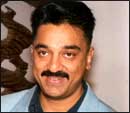 There are so many inputs and there are so many undeserving, as well as humble
contributors. Some don't contribute at all and those people I call undeserving.
There are some who really contribute and walk away without even asking for
applause.
There are so many inputs and there are so many undeserving, as well as humble
contributors. Some don't contribute at all and those people I call undeserving.
There are some who really contribute and walk away without even asking for
applause.
Even if you say I made Hey! Ram, it wouldn't be completely right. It is not possible to do it alone. My cameraman, my art director and my costume department are equally important. I could sleep well at night because I had this crew.
I don't say this out of humility. I'm confident I would have made Hey! Ram without the Thirus and Sarikas, but that's an arrogant way of looking at it. It would have moved away inch by inch from whatever little perfection we've achieved.
About this closet direction, no. Mine was a glass case. Everyone knew.
At what point did the director in you start taking over?
I have been doing this right from the beginning. I never wanted to be an actor. I love my crew. I want to be with them, not rise above them. Rising above them is easy. You become a tyrant, a genius or an eccentric. You rise above them and they give you a misnomer. They'll call you a tyrant, a genius and vice versa.
Mediocrity has been the standard and the easiest thing to achieve. To rise above mediocrity is about the best thing for any man who seeks excellence. But I am not even rising above mediocrity. I am mediocre and have kept myself that way."
Aren't you being too modest?
No, I'm not. I am mediocre because that is my audience. It is not that I am generalising. The daily collection report says that my general audience is mediocre. The minorities who talk as cleverly as I do don't matter because they can have a private conversation with me.
It's said that when you make suggestions, they seem to enhance your character but do not contribute to the general flow in the film. Is that a rather selfish approach?
As an actor, if you will take my suggestion, well, that's what I'll do. That's what even Marlon Brando would do.
I'm not going to tell him how to place the shot. If he asks me how to place the shot, it might improve the general film itself but nobody does that. I wouldn't.
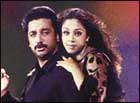 Girish Karnad worked in my film. I will never go and ask him how to do a certain
scene. But I would take his suggestion and analyse it.
Girish Karnad worked in my film. I will never go and ask him how to do a certain
scene. But I would take his suggestion and analyse it.
Right from the beginning, I've been working as an assistant director to all my directors. Even now, for me, the making of the film is more important. It doesn't matter who gets the title. I can afford to say that because I have my face printed on celluloid.
Isn't it also because you have more at stake than anyone else?
For the last 15 years, it's my neck on the line every time. Nobody has the audacity to talk about personal losses, if at all there is any.
Well, aesthetics does not have a price. But if at all anybody's neck is on the line, it's mine. And I bear it every time with minimum pain to others.
That's why I don't try a Apoorva Sahodarargal (Appu Raja in Hindi) for others. Well, when it succeeds, it's okay but when it doesn't, it becomes a Hey! Ram. But the pain is similar and enormous. I cannot dump it on somebody.
When I do it for others, I see to it that it's something as simple as a Guna or a Mahanadhi. Even if something goes wrong, the investment is minimal. Or, for that matter, even Thenali. It is quite a compact film and won't crunch into their bank account.
Talking about a mediocre audience, do you call them so because they don't seem to like what you do?
It's not that. It's the general attitude to look at the human. Vendors are now deciding what the editorial will be in a newspaper. The downfall is not the people. When the vendor decides, then the newspaper is gone.
So who calls the shots in the film industry?
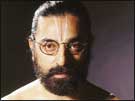 The middleman, always. When they call the shots, that's the end of the film.
The middleman, always. When they call the shots, that's the end of the film.
Even where a Kamal Hassan is concerned?
Everybody. I am talking about the whole industry. From the time the studios and their distribution network failed, the middlemen emerged. They have nothing to lose.
But that doesn't seem to have stopped you from experimenting. Are you the rebel then?
I keep trying because I'm a student of cinema and a film buff. That's why for the last ten years, I've not done a single day's work. It's a continuous paid holiday for me. I don't care.
I am worried when people don't appreciate work. But the minority has been so kind to me. That's why I won't insult them. As a matter of fact, my survival comes from the minority, who go around like propagandists telling others how good my films are. But the purpose is not served.
My kind of films mature and I've already sold the wine. Somebody else matures that drink, not me. I lose. But mediocrity comes from training. It's not a DNA structure.
Do you feel you're unique because the common man likes you as much as the cognoscenti?
That's because I've humbled myself. I am not reluctant to shake hands with the common man. I used to be a common man and all that I've achieved is not real. It's all piled on to me; it's acquired.
The core is the same, simple man. That is why I see the difference. But you can't segregate the two genres and cater simply to one.
That way, you are risking the market saleability factor. I'm the brand, so I can't have a Lifebuoy and a Surf. It's not a filter cigarette versus a non-filter cigarette, produced by the same company.
So what are you trying to do? Raise the audience's taste?
No, no. Just trying to walk the tightrope and hope for applause.
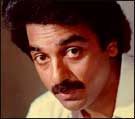 And what happens when an underrated classic (like Mahanadhi)
flops?
And what happens when an underrated classic (like Mahanadhi)
flops?
For me, Mahanadhi is a very important film. It's going to the Rotterdam festival -- pretty late, I know, six years since its release. But now Mahanadhi, Kurudhippunal, Hey! Ram, Nayakan and Pushpak are going to the festival.
It is called Focus On A Filmmaker, and focuses on a filmmaker who has a mulit-dimensional contribution to films. So one film will promote me as an actor, one a director, another as a writer and one as a participant who creates on the spot.
I have no complaints.
PART - 2
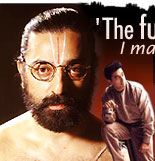

Is it difficult directing yourself? Is it frustrating not being able to watch yourself perform?
No, because everything was being shot on video. No shot is okayed without a replay. Both Jekyll and Hyde are on the sets.
Did you get what you expected from Hey! Ram?
I expected from Hey! Ram whatever I expected from all my other films -- success.
There is another catch to it. If Hey! Ram had succeeded, it would have changed the face of Tamil cinema. That's for sure.
I am not talking through my hat. Even if someone else had made the film, it would have meant the same.
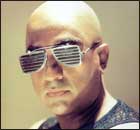 Films like that have done it before. The thrust was five years, like an election
campaign. I expected Hey! Ram
to do that. It had that quality, and not because it was my film.
Films like that have done it before. The thrust was five years, like an election
campaign. I expected Hey! Ram
to do that. It had that quality, and not because it was my film.
What was the genesis of the film? How did you hit upon Saket Ram? Was it just to hold a contrary view to evoke reaction?
It starts from a little joke when a little girl browsing through her parents' wedding pictures asks, "Where was I?"
I asked myself, what would have I done had I been there? Would I have been any wiser or would I have been sucked into the vortex? Actually, I would have been as naïve and as stupid as the people of that time. People were captives of the situation.
The one person who rose above it was Gandhi. So he was alone.
I felt it was high time someone at least felt sorry instead of licking their tongue like a Farex baby at the situation. That's neither mamta (affection) nor sympathy.
That's the kind of kindness we've been showing Gandhiji and that's the kind of neglect we've shown to one of our notorious crimes. It's a combined sanction. Somewhere in our minds, we sanctioned it. It was not one man.
In a country of millions, a political act is not one man's act. I wanted to address these people and found a section of them.
But did you start off thinking it was a one-man act? One allegation is that it started off as an anti-Gandhi film but turned ambiguous.
No, no. If at all I am a closet anything, I am a closet Gandhi fan. Nobody knows that, though. I kept it a secret because as a teenager, I have said unfavourable things about Gandhiji. So you feel ashamed to turn back on what you've said.
It's not chic to be a Gandhi fan. And it is clichéd to say Gandhi is a good man because it has been said a million times before. He is even on a damn rupee note. It is as boring as a non-detailed lesson. You are never going to get the moral of it till you get a detailed story.
So I was interested in (Nathuram)
Godse's point of view. I wanted to get into the psyche. You may say that The
Day Of The Jackal was an inspiration, but no. The Jackal was
unrepentant. Here, the killer is a confused man, but not a fool." 
Did you toy with the idea of Godse as the central character?
No. I was very clear that here was a man who was sucked in.
My themes are very repetitive. All filmmakers have one theme, like the Samurai theme for Kurosawa and the suspense theme for Hitchcock.
Mine is a man's suffering and his struggle to rise above it. If you look at it, however compliant he may have been to the whole thing, Godse is responsible for the act and has to redeem himself. It's not about crime and punishment. It's about realisation and redemption.
Today, Hey! Ram is a lesson at Iowa University. The professor who teaches it, an American, is a Ramayana expert and a Hey! Ram supporter. He likes Gandhi and is not a fascist. I wanted to walk through that period, talk to the characters and come out.
It's a very dangerous experiment and that's why I called it 'an experiment with truth'.
Rumour is that you are deep in debt and that's why you're on this signing spree.
Could be. Yeah. Not fully true but the debt is one's own definition. Well, Rs 120 to Rs 150 million is a lot of money. I have to get it back and I am smiling. There's no panic.
What is it that keeps you going if it's no longer the money?
I have something to do, which I haven't. We have to show that we're capable of good films too. I was just talking to Mani Ratnam.
We were saying, 'What are we doing?' Finally, we were talking about various stories that will work here.
Are we talking about that or yet another compromise and failing and taking insults from an audience whom mentally we're not making a film for?
So we are not willing to be the courtesans they expect us to be. Or, if marriage proposed, we are not professing that we'll take celibacy. So, we were trying to seek direction, trying to see 'whether he can see horizon better than I can'.
Rumours are rife that Mani and you are getting together again.
Ya, we're talking about it. Depends on what we arrive at.
 Do you think your old favourites like K Balachander and Bharathi Raja
have failed to adapt to the times?
Do you think your old favourites like K Balachander and Bharathi Raja
have failed to adapt to the times?
This is something I fail to understand because Kurosawa kept pace till he died. There'll always be the young Turks who will say he's a bloody old man. That will happen to me and Mani too. But Satyajit Ray was at it till the last moment.
Why talk about dead men? Let's talk about Benegal Saab (Shyam) or Govind Nihalani.
But you are talking about a section which was very clear. They never wavered.
Well, Mani and I never wavered. Especially Mani. I was astounded by him. I sort of vacillate sometimes. He never did. It's probably that business management training. He's very clear.
I'd say the same of Balachander. By default or by choice, I don't know. He never got out of the middle-class milieu. He was very clear about his audience.
In a way, I can't do that. Probably wisdom will set in, later.
Chaplin (Charlie) was comfortable with what he did till he was 60. Never complained and then he did Limelight. Till then he was a willing clown.
The only man I admire who transgressed is Spielberg. That must have been from (Francis Ford) Coppola, who must have been a great inspiration. Coppola was another who, when he was finished with the mafia saga, made Rumble Fish. Astounding.
We all come from the same family with Coppola as the elder brother and Kurosawa as the father figure.
You have come to a stage where you shoot one film at a time. Do you think it would enhance your performance if you shot in a chronological order?
Sometimes it does help. With Abhay, we're shooting one character at a stretch. We're trying. It's not a method.
For that matter, Thevar Magan was shot in that chronology. Hey! Ram was jumping chronology but I was going through it every time.
Is it an advantage or a disadvantage?
It is a disadvantage as far as production planning is concerned.
I'm talking about the flow in the film.
No, that you have to work out at the script stage. Like when I explain a scene to some good writers, they pooh-pooh it and you have to really stick on and show it on screen. Without a second thought, they say, brilliant. Which means it was not their ego.
 They had not seen that scene at all. It's some sort of unicameral vision they go
into. It's a parallax error there.
They had not seen that scene at all. It's some sort of unicameral vision they go
into. It's a parallax error there.
Now this character in your next film Abhay has many shades of Hannibal Lector of Silence Of The Lambs.
Abhay is based on a novel written by me. Nandu is Hannibal Lector and was conceived much before Thomas Harris conceived the character. He wrote it in 1989 while my book came out in 1983. Nobody wanted to make it into a film them. Now the time has come.
There was the young Kamal in the 1980s constantly seeking variety and even playing elderly characters. Kamal in 2000s is seen prancing around with young actresses...
The 1980s' Kamal was also prancing around. This dancing and prancing around and romancing heroines is on request. It comes absolutely from the audience. They want one dance and the request comes from someone in Silicon Valley.
Do not blame me because I keep giving them variety.
A Mrinal Sen as well as a David Dhawan appreciates and wants to work with you. But you don't seem to want to play. Why haven't you worked with Mrinalda or Benegal?
It hasn't worked. When I was in the thick of Thevar Magan, Mrinalda wanted me, but I couldn't go. He was angry and I could understand.
I tried working with Govind, but things haven't worked out.
I am constantly in touch with Benegal because he's my inspiration for Marudanayagam. He saw the script and his excitement was contagious. He thinks it is colossal and gave his suggestions. He's a young man with a bald head. His spirit is great.
In fact, Govind and Manmohan Shetty, after Hey!
Ram took a nosedive, had a small party, quietly and kept saying good
things about the film. It was a touching gesture. 
How do you rate the present crop of directors in the South?
There are talented youngsters strewn all over, but all this talk about Madras creating the best technicians is humbug. We have great cinematographers. We have genius but so do Bombay and Bengal.
There seems to be something stopping these youngsters from approaching you.
Tell me who they are. They all come to me but probably when they're wiser. They don't have anything striking to offer.
Even Mani and I are still talking. It's not just Kamal to be fed. We have to feel the spirit that's kindled when we hear something. Success and failure don't matter. Nobody knows anyway.
Have you seen any good film of late?
Plenty. All of them are good for various reasons. Saw a series of Roberto Benigni's films. Life Is Beautiful and Seeking Asylum.
I recently saw a 25-year-old film. I was floored. It was shown on HBO and the film is Godfather. Absolutely classic. There are no two ways about it. I said it then and I am saying it now.
Performances do not have to be the latest when you're looking at the greatest. What control! The credit goes completely to Coppola. I haven't seen any Indian films. Very few are inviting.
You are at a crossroads. In the sense that you may have to play character roles in a couple of years. Would that wound your ego?
I may not act at all. That's what I tell people, but nobody takes me seriously. I might slip behind the camera. It would have happened if Hey! Ram had succeeded.
Don't tell me you're going to hang up your makeup kit?
No, I might appear in one scene. I've relied too much on the star now. I am not complaining. I'm just saying I might take that route. I'm not committing.
Where does Kamal Hassan go from here?
Anything. It could be John Wayne for all you know.